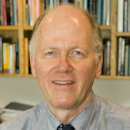Mapping Human Cerebral Cortex: Structure, Function, Connectivity, Development, and Evolution
- Speaker
-
 David Van Essen, Ph.D.Alumni Endowed Professor of Neuroscience, Washington University in St. Louis
David Van Essen, Ph.D.Alumni Endowed Professor of Neuroscience, Washington University in St. Louis
Presidential Lectures are free public colloquia centered on four main themes: Biology, Physics, Mathematics and Computer Science, and Neuroscience and Autism Science. These curated, high-level scientific talks feature leading scientists and mathematicians and are intended to foster discourse and drive discovery among the broader NYC-area research community. We invite those interested in the topic to join us for this weekly lecture series.
By clicking to watch this video, you agree to our privacy policy.
The cerebral cortex is the dominant structure of the human brain and is chiefly responsible for what makes us unique as a species and as individuals. Recent advances in noninvasive imaging combined with invasive approaches in animal models are transforming our understanding of the human brain’s structure, function, connectivity, evolution, health and development.
In this lecture, David Van Essen will discuss progress in understanding the human cerebral cortex in the context of health and disease. This discussion will include an overview of basic principles of cortical organization and connectivity from studies of laboratory animals and analyses of individual variability in humans. He will highlight a new map (‘parcellation’) of the human cerebral cortex based on data from the Human Connectome Project. Comparisons of cortical organization across species reveal valuable insights about what makes us uniquely human.
